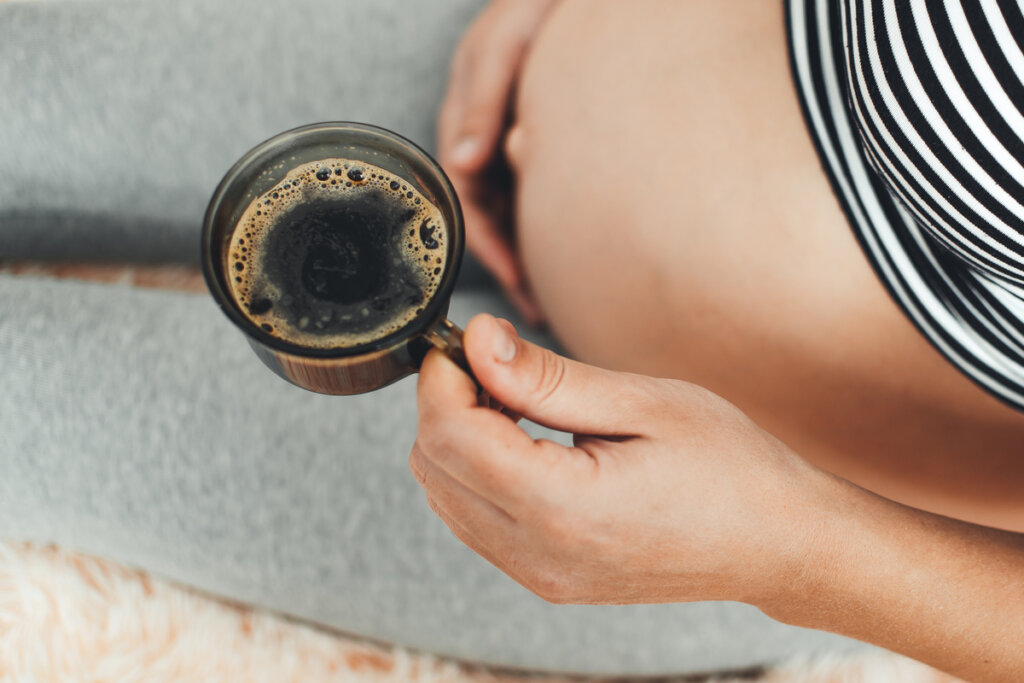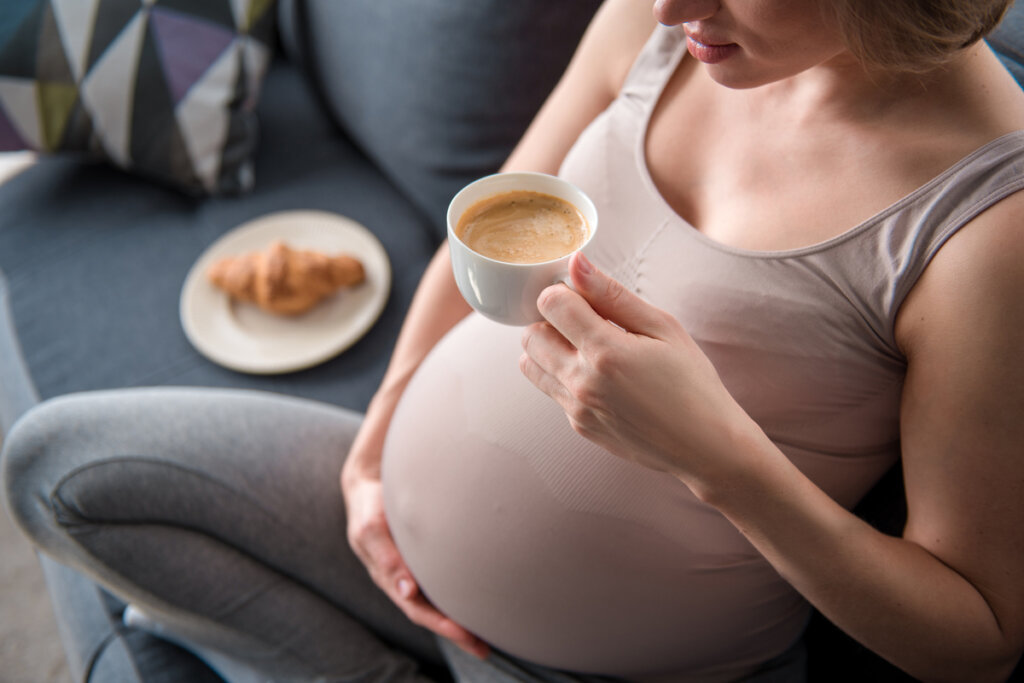Is It Safe to Consume Caffeine in Pregnancy?


Written and verified by the psychologist María Paula Rojas
For some women, becoming pregnant is one of the greatest achievements in their life. Nevertheless, despite this happiness, they often experience multiple doubts. Can they exercise? How can they help their baby develop better? One of the most common questions is whether it’s safe to consume caffeine. As a matter of fact, there are many theories and perspectives on this topic, which, instead of giving answers, can frequently generate even more doubts in mothers. Here, we’ll focus on both the positive and negative effects of caffeine consumption in pregnancy. We’ll examine the effects on both mother and baby.

Caffeine
Caffeine is the most consumed psychoactive substance in the world. Although we tend to associate the substance with coffee, the truth is that it’s also found in tea, cocoa, and cola, among others. It belongs to the family of methylxanthines, one of the stimulants of the nervous system. It helps to release norepinephrine (essential for the proper functioning of the brain) and increases vasoconstriction.
Thanks to its stimulating effect on most people, caffeine is usually consumed at breakfast-time. In addition, constant consumption is generally maintained throughout the day. This leads to a concentration of caffeine in the body. As a consequence, there are both benefits and harmful effects.
Consumption and metabolism of caffeine in pregnancy
The consumption of caffeine during pregnancy is linked to the mother’s daily habits. However, factors, such as nausea or vomiting, can cause pregnant women to significantly reduce their consumption. Mothers-to-be also tend to reduce or eliminate the consumption of other substances such as alcohol or tobacco during pregnancy, due to the idea that this is healthier for the baby.
It’s also important to understand that, in the case of pregnant women, the metabolism of caffeine can be much slower. This phenomenon especially occurs in the last trimester of pregnancy, due to changes in the functionality of the mother’s kidneys. Therefore, the elimination of caffeine is much slower, meaning that it can be in contact with the baby for between 80 and 100 hours.
Additionally, caffeine has been found to have the ability to cross the placental barrier, making exposure to the fetus direct. To this, we must add that both the fetus and the placenta don’t have the capacity to metabolize caffeine well. Therefore, the exposure lasts longer and may have consequences on the baby’s development.
Effects on the baby linked to caffeine consumption during pregnancy
It should be clarified that most of the negative effects that the baby presents are related to a medium to high consumption of caffeine. The World Health Organization (WHO) recommends that caffeine consumption during pregnancy or while breastfeeding shouldn’t exceed 300mg per day. Translated into everyday units, this translates into two or three cups of coffee.
There are different negative effects related to caffeine consumption. However, there’s no total agreement on this, due to the disparate results presented in investigations. Some of the effects are as follows:
- A decrease in the frequency of cardiac and placental blood flow can lead to the development of cardiovascular malformations.
- Decreased intrauterine growth increases the risks of developing different diseases at birth.
- Low birth weight due to increased vasoconstriction generated by caffeine and a consequent drop in nutrient intake.
- Increased risk of miscarriage. This relationship has been found especially when consumption occurs in the first trimester of pregnancy.
On the other hand, it’s important to indicate that, during the lactation period, the mother should continue to consume only the recommended dose of caffeine per day. This is because, due to the nature of caffeine, it can reach the baby through breast milk. As a consequence, the baby could have sleep disturbances and present a notable increase in irritability.

Can caffeine consumption protect the mother from diseases?
There are many studies that have been conducted on the benefits of caffeine in the human body. One of the most striking is its ability to prevent the development of type 2 diabetes. That’s because caffeine helps improve glucose tolerance and decreases insulin sensitivity.
In the case of expectant mothers, women who consume caffeine during pregnancy have been found to have a decreased risk of developing gestational diabetes. This is because caffeine helps improve insulin resistance, which is usually reduced during pregnancy.
In addition, caffeine consumption during pregnancy has been found to help lower the risk of preeclampsia because it improves blood pressure. As a result, it protects vascular function during pregnancy, which leads to a reduction in multiple complications.
Is it good or not to consume caffeine during pregnancy?
It’s important to understand that the recommended consumption of caffeine must be controlled during pregnancy and lactation. As we mentioned earlier, controlled consumption can help the mother in different aspects. However, exceeding the intake can have consequences on the development of the baby.
We know that pregnancy is a period that’s often unforgettable and that generates great changes in the life of the mother. When the mother-to-be is calm and controls what they consume with the help of a specialist, it can make the whole experience extremely satisfactory, not only for her but also for her family.
For some women, becoming pregnant is one of the greatest achievements in their life. Nevertheless, despite this happiness, they often experience multiple doubts. Can they exercise? How can they help their baby develop better? One of the most common questions is whether it’s safe to consume caffeine. As a matter of fact, there are many theories and perspectives on this topic, which, instead of giving answers, can frequently generate even more doubts in mothers. Here, we’ll focus on both the positive and negative effects of caffeine consumption in pregnancy. We’ll examine the effects on both mother and baby.

Caffeine
Caffeine is the most consumed psychoactive substance in the world. Although we tend to associate the substance with coffee, the truth is that it’s also found in tea, cocoa, and cola, among others. It belongs to the family of methylxanthines, one of the stimulants of the nervous system. It helps to release norepinephrine (essential for the proper functioning of the brain) and increases vasoconstriction.
Thanks to its stimulating effect on most people, caffeine is usually consumed at breakfast-time. In addition, constant consumption is generally maintained throughout the day. This leads to a concentration of caffeine in the body. As a consequence, there are both benefits and harmful effects.
Consumption and metabolism of caffeine in pregnancy
The consumption of caffeine during pregnancy is linked to the mother’s daily habits. However, factors, such as nausea or vomiting, can cause pregnant women to significantly reduce their consumption. Mothers-to-be also tend to reduce or eliminate the consumption of other substances such as alcohol or tobacco during pregnancy, due to the idea that this is healthier for the baby.
It’s also important to understand that, in the case of pregnant women, the metabolism of caffeine can be much slower. This phenomenon especially occurs in the last trimester of pregnancy, due to changes in the functionality of the mother’s kidneys. Therefore, the elimination of caffeine is much slower, meaning that it can be in contact with the baby for between 80 and 100 hours.
Additionally, caffeine has been found to have the ability to cross the placental barrier, making exposure to the fetus direct. To this, we must add that both the fetus and the placenta don’t have the capacity to metabolize caffeine well. Therefore, the exposure lasts longer and may have consequences on the baby’s development.
Effects on the baby linked to caffeine consumption during pregnancy
It should be clarified that most of the negative effects that the baby presents are related to a medium to high consumption of caffeine. The World Health Organization (WHO) recommends that caffeine consumption during pregnancy or while breastfeeding shouldn’t exceed 300mg per day. Translated into everyday units, this translates into two or three cups of coffee.
There are different negative effects related to caffeine consumption. However, there’s no total agreement on this, due to the disparate results presented in investigations. Some of the effects are as follows:
- A decrease in the frequency of cardiac and placental blood flow can lead to the development of cardiovascular malformations.
- Decreased intrauterine growth increases the risks of developing different diseases at birth.
- Low birth weight due to increased vasoconstriction generated by caffeine and a consequent drop in nutrient intake.
- Increased risk of miscarriage. This relationship has been found especially when consumption occurs in the first trimester of pregnancy.
On the other hand, it’s important to indicate that, during the lactation period, the mother should continue to consume only the recommended dose of caffeine per day. This is because, due to the nature of caffeine, it can reach the baby through breast milk. As a consequence, the baby could have sleep disturbances and present a notable increase in irritability.

Can caffeine consumption protect the mother from diseases?
There are many studies that have been conducted on the benefits of caffeine in the human body. One of the most striking is its ability to prevent the development of type 2 diabetes. That’s because caffeine helps improve glucose tolerance and decreases insulin sensitivity.
In the case of expectant mothers, women who consume caffeine during pregnancy have been found to have a decreased risk of developing gestational diabetes. This is because caffeine helps improve insulin resistance, which is usually reduced during pregnancy.
In addition, caffeine consumption during pregnancy has been found to help lower the risk of preeclampsia because it improves blood pressure. As a result, it protects vascular function during pregnancy, which leads to a reduction in multiple complications.
Is it good or not to consume caffeine during pregnancy?
It’s important to understand that the recommended consumption of caffeine must be controlled during pregnancy and lactation. As we mentioned earlier, controlled consumption can help the mother in different aspects. However, exceeding the intake can have consequences on the development of the baby.
We know that pregnancy is a period that’s often unforgettable and that generates great changes in the life of the mother. When the mother-to-be is calm and controls what they consume with the help of a specialist, it can make the whole experience extremely satisfactory, not only for her but also for her family.
All cited sources were thoroughly reviewed by our team to ensure their quality, reliability, currency, and validity. The bibliography of this article was considered reliable and of academic or scientific accuracy.
- Morales, M., Sosa, C., González, G., Umpiérrez, E., Berta, S., & Borbonet, D. (2014). Relación entre el consumo de mate en el embarazo con el peso al nacer. Archivos de Pediatría del Uruguay, 85(1), 18-24.
- Ortiz, N. del C. (2016). Modificación y efectos del consumo de cafeína durante el embarazo [Http://purl.org/dc/dcmitype/Text, Universidad de Granada]. https://dialnet.unirioja.es/servlet/tesis?codigo=56295
- Rodríguez-Pinilla, E., Real, M. M., Mejías, C., García-Benítez, M. R., Fernández, P., & Martínez-Frías, M. L. (2010). Consumo de cafeína en el embarazo en nuestro medio y riesgo para el desarrollo embrionario/fetal. Revista de Dismorfología y Epidemiología., V(9).
This text is provided for informational purposes only and does not replace consultation with a professional. If in doubt, consult your specialist.







